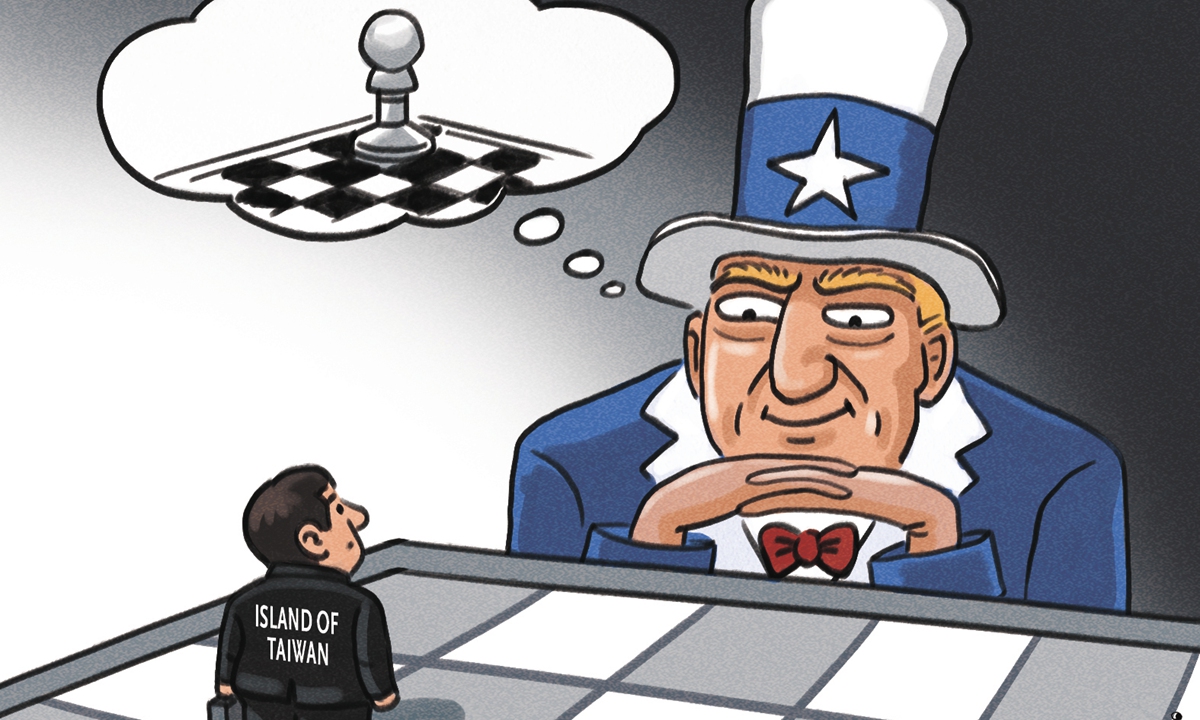Stronger ties with Washington won’t buy time for Taiwan
By Zhou Wenxing Source: Global Times Published: 2020/7/20 15:48:40

Illustration: Liu Rui/GT
Taiwan's 36th annual Han Kuang military exercise, the island's largest military drill, kicked off on July 13 based on the scenario of an "invasion" by the mainland military. But what deserves much more attention is the US role behind the island's display of its military power.
Under the leadership of the independence-leaning Democratic Progressive Party (DPP), Taiwan's refusal to accept the one-China principle and its rejection of Beijing's reunification efforts have gained growing support from Washington. Since US President Donald Trump took office in 2017, the US has been increasingly improving its political and particularly military relations with the island of Taiwan.
The Trump administration just approved its seventh deal of arms sales to Taiwan earlier this month. This makes the Trump administration the most pro-Taiwan US administration since Richard Nixon. The total sum and frequency of military sales to the island of Taiwan have rarely been seen since Washington diplomatically recognized Beijing in 1979. Besides, US warships frequently sail through the Taiwan Straits, aggravating regional tensions and leading to regional instability.
In addition, the US Congress has introduced more than 50 Taiwan-related bills and resolutions in the past three and half years. Six have been enacted, including the Taiwan Travel Act, Asia Reassurance Initiative Act of 2018, Taiwan Allies International Protection and Enhancement Initiative (TAIPEI) Act of 2019, and three National Defense Authorization Acts for fiscal year 2018-2021. All of these laws and bills advocate a stronger and more comprehensive Washington-Taiwan relationship, including the enhancement of the so-called defense relationship.
The pro-Taiwan policy that Washington has adopted has resulted in huge influence on the cross-Straits ties.
First, it has affected the party politics on the island. US support undoubtedly consolidates Tsai Ing-wen's power and her party's ruling foundation on the one hand, while undermining the mainland-friendly Kuomintang's (KMT) political power base on the other. Tsai could not be successful in her reelection bid in 2020 without the US support. This makes the prospect of a détente between the two sides of the Taiwan Straits more difficult.
More importantly, further US intervention in the Taiwan question encourages the Taipei authorities and separatists to take more aggressive actions. These trends have led to the deterioration of political and security situations across the Taiwan Straits. As the latest report by the International Crisis Group reveals, continued US military presence makes the Taiwan Straits one of a few places with a "deteriorating situation."
The reason for Washington's unprecedented interference in Taiwan is mainly due to the structural changes in the US-China relations. One may have noticed that when bilateral ties developed smoothly in the 1970s and 1980s, Washington remained relatively restrained on the Taiwan question. However, when the US-China ties soured, and especially since China has been treated as a strategic competitor, the US was more likely to step in China's domestic affairs and use Taiwan as a strategic "card" to balance against the Chinese mainland - as the George W. Bush administration did well before the 9/11 attacks. In a nutshell, Taiwan is nothing but a card that will be played by the US against the mainland whenever Washington finds it expedient to do so.
Deteriorating US-China relations make the Taiwan card relevant again in US' Indo-Pacific Strategy. Indeed, the island of Taiwan has been viewed in Washington as an ally against Beijing within the framework of the Indo-Pacific Strategy. However, the military balance has already tilted toward the favor of the Chinese mainland.
During the Han Kuang drills, two pilots of a Taiwan military helicopter were killed on Thursday when their aircraft crashed in the north of the island. The military mishap during the Han Kuang drills indicates that Taiwan's most important war games are becoming increasingly unrealistic. It also shows a widening military gap across the Taiwan Straits. In the face of a rising China, a stronger relationship with Washington won't buy time for Taipei.
US political elites must realize that interfering in China's internal affairs is never an appropriate way to compete with the latter. It only complicates the Taiwan question, adds tensions in the Taiwan Straits, and increases regional instability. Instead, they should cooperate with their counterparts on the Chinese mainland on global issues such as the current pandemic raging across the world. Only by doing this can the US strengthen its global leadership and help maintain the peace and stability of the Taiwan Straits.
The author is now a research fellow at Shang Dao Institute for Social Research. He holds a doctorate in Public Administration from Shanghai Jiao Tong University and was Asia Fellow at Harvard University. opinion@globaltimes.com.cn
Posted in: VIEWPOINT